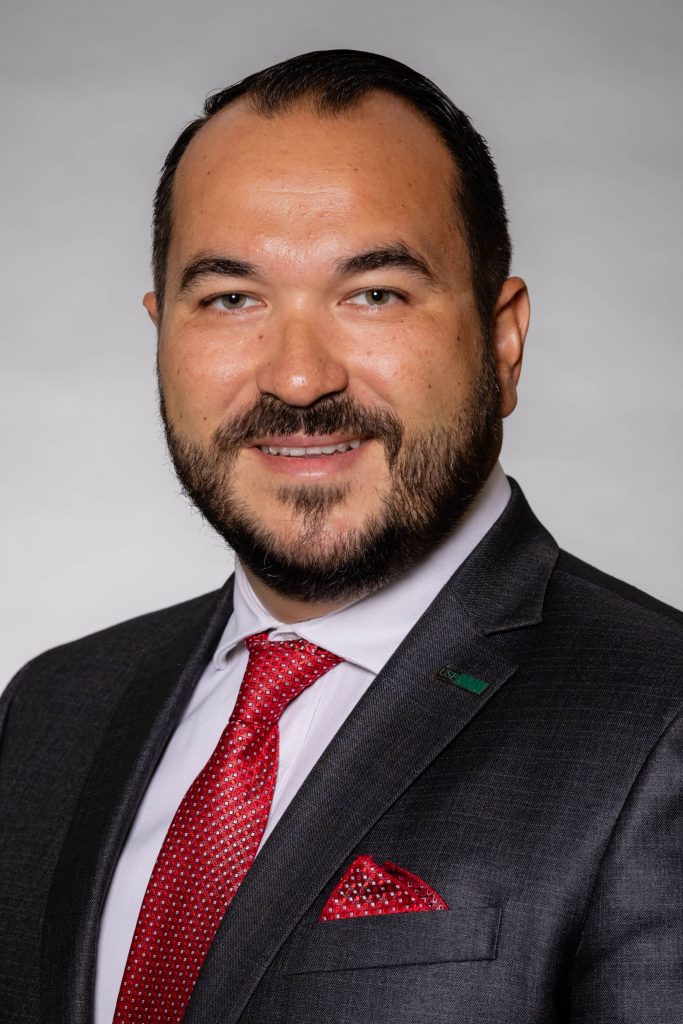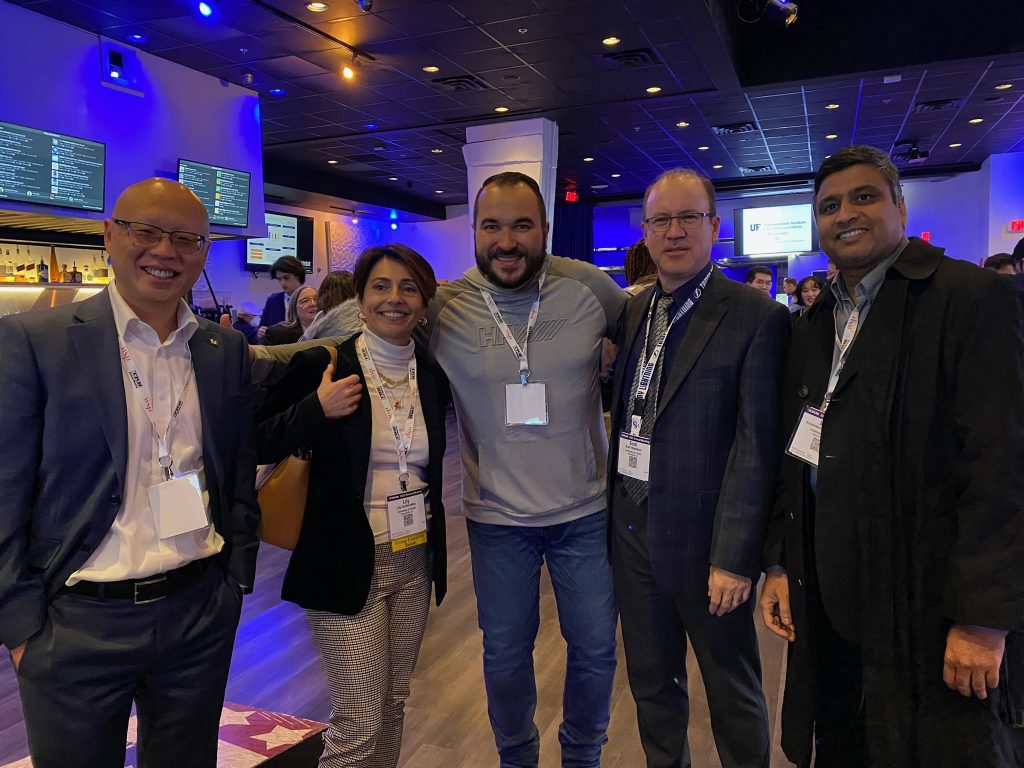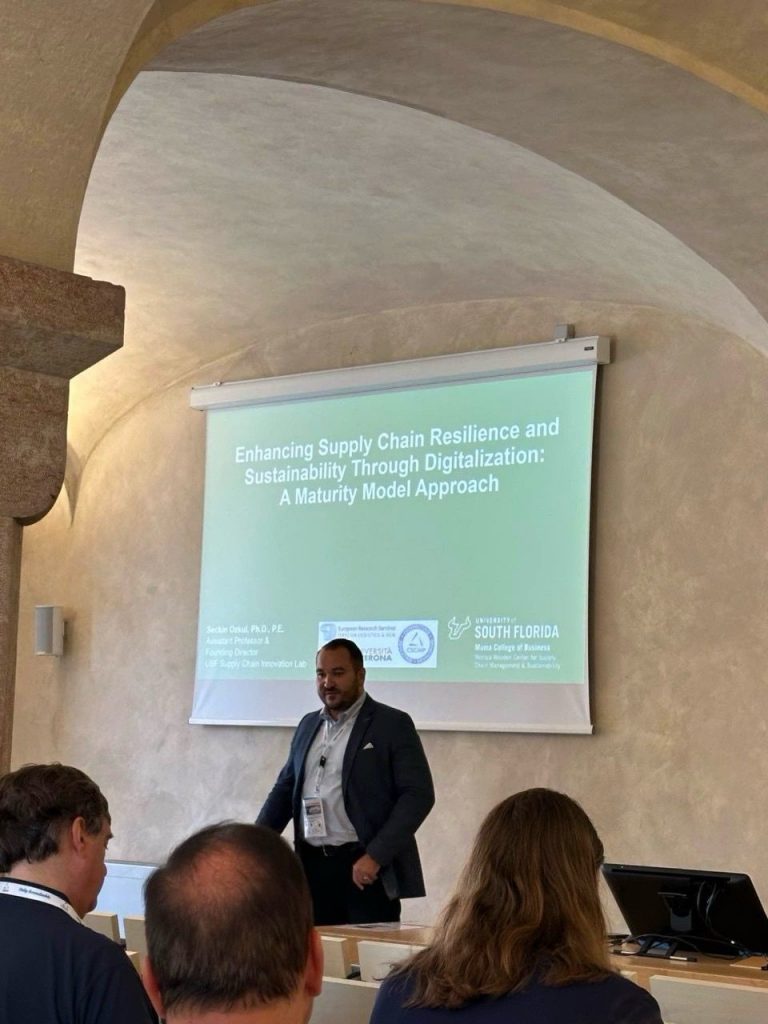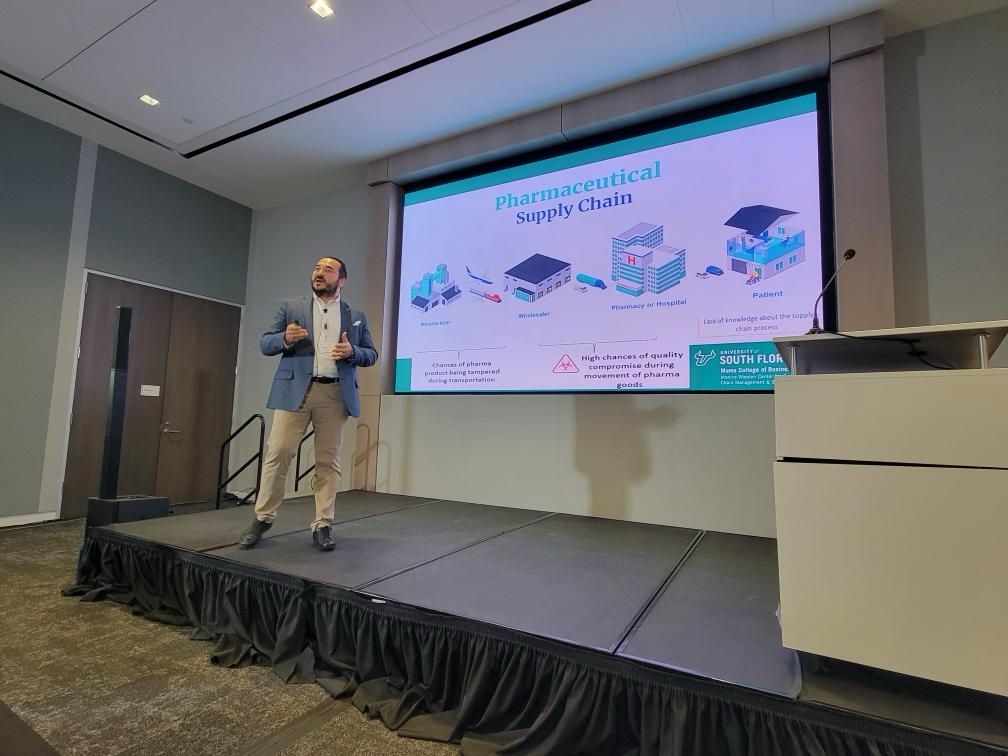By Ines Aviles-Spadoni, M.S., M.A., Research/Communications Coordinator, UFTI

Sometimes, a single class in college can spark a career built on innovation, inspirational leadership, and real-world impact.
For Seckin Ozkul, Ph.D., P.E., assistant professor and director of the University of South Florida (USF) Supply Chain Innovation (SCI) Lab at the Muma College of Business, that spark was ignited during his undergraduate studies at Auburn University, Alabama. Ozkul would light up when learning how transportation systems and freight logistics influence communities, economies, and everyday life.
“I became fascinated by the complexity of freight logistics, how a well-planned system could improve both efficiency and performance,” Ozkul said. “That early exposure motivated me to pursue graduate studies in transportation engineering so I could bridge network design with data-driven decision-making in freight and logistics systems.”
The gator engineering experience
At UF, that fascination matured into a focus on freight operations and supply chain optimization, where Ozkul developed the research and leadership skills that define his work today. Ozkul entered the transportation engineering program at UF’s Department of Civil and Coastal Engineering in 2010. He chose the program because of its top-notch transportation engineering faculty in freight operations, modeling, and simulation.
“I wanted to learn from that world-class community of scholars and practitioners,” Ozkul said. “The program’s partnership with FDOT and its integration with the STRIDE Center provided an exceptional environment to conduct research that directly informs real-world policy and infrastructure decisions.”
Mentors who made a difference
Mentors who shaped his technical and leadership skills included Scott Wasburn, Ph.D., P.E., professor emeritus in UF’s Department of Civil & Coastal Engineering, who served as his doctoral dissertation advisor, and Yafeng Yin, Ph.D., who is now the Donald Malloure Department Chair of Civil and Environmental Engineering at the University of Michigan.
“I was fortunate to be mentored by Dr. Washburn, who guided my research from concept to completion and shaped how I think about applied problem-solving in transportation systems,” Ozkul said. “I also had the privilege of learning from Dr. Yin, whose expertise in transportation systems analysis broadened my understanding of optimization and policy modeling.”
Ozkul says he will never forget how, during one of the most critical times in his doctoral program, Yin took the time to help him clarify and prepare for the topics he would be tested on for his doctoral qualifying exam.

“His timely guidance ensured I was well-prepared for that pivotal milestone, and I remain deeply grateful for his support,” Ozkul said.
Also important to Ozkul’s graduate program at UF were Lily Elefteriadou, Ph.D., distinguished professor of civil engineering, and Siva Srinivasan, Ph.D., professor and associate director of the UFTI.
“Dr. Lily Elefteriadou, then director of UFTI, was an invaluable mentor whose leadership and accessibility helped me navigate challenges and remain motivated during demanding phases of my Ph.D., and Dr. Siva Srinivasan, always understanding and kind, offered consistent support, thoughtful feedback, and encouragement that made a lasting impression on me both professionally and personally,” he said.
The dissertation with a real-world impact
Ozkul’s dissertation focused on operations and freight transportation, modeling the operational and economic impacts of commercial trucks on freeways and multilane highways.
“I wanted to improve how we represent heavy-vehicle performance dynamics in capacity and simulation models, something that had been largely simplified in traditional methods,” he said. “By integrating advanced vehicle dynamics into these models, my research sought to make freight planning and design decisions more realistic and efficient.”
Ozkul’s dissertation work led to the creation of updated truck speed-distance-grade curves that were integrated into the Highway Capacity Manual (HCM), a publication of the Transportation Research Board (TRB) of the National Academies of Sciences (NAS). The manual serves as the national reference for highway capacity and quality of service analysis.
The Supply Chain Innovation Lab at USF
Ten years have passed since Ozkul graduated from UF. During that time, he founded the Supply Chain Innovation (SCI) Lab at USF. The lab was created to serve as a bridge between academia, government, and industry, where research is converted into real-world supply chain solutions.
The lab has led projects for the U.S. Department of Transportation (USDOT), U.S. Department of Agriculture (USDA), Federal Aviation Administration (FAA), National Cooperative Highway Research Program (NCHRP), Florida Department of Transportation (FDOT), Jabil, Inc., and the Florida High Tech Corridor, among others, and represents Ozkul’s vision of bringing together supply chain management, transportation engineering, and technology innovation to develop more resilient and sustainable networks. The lab’s research focuses on AI-driven workforce training, supply chain network design and optimization, cargo consolidation optimization, and digital supply chain transformation.

Ozkul explained that one project captures the lab’s mission perfectly: An AI-powered workforce training initiative sponsored by Jabil, Inc., and supported by the Florida High Tech Corridor. Through this collaboration, large-language-model (LLM)-based tools are being developed to modernize how supply chain professionals are trained, helping organizations adapt better to disruptions and new technologies.
“It is an exciting convergence of AI, logistics, and human-capital development, and it reflects how far-reaching transportation and supply-chain innovation has become since my days as a UF doctoral student,” Ozkul said.
Service to the Profession
Beyond his lab, Ozkul has taken on national-level leadership roles, including being appointed as the inaugural chair of TRB’s Standing Committee on Freight Economics and Supply Chains (AT011). He is also proud to have served as the last chair of the Standing Committee on Freight Transportation Economics and Regulation (AT010) before TRB’s decision to restructure all committees in 2025.
Ozkul says those roles and others have provided him with the opportunity and privilege to work with leading scholars, practitioners, and policymakers. But one person – a friend and colleague – stands out as providing consistent advice throughout his years of involvement with TRB – Bill Eisele, Ph.D., P.E., associate agency director and research group lead of Texas Transportation Institute’s Planning Group at Texas A&M University.
Lifelong connections and friendships at UF
Ozkul also carries with him the friendships made while at UF in Gainesville, Florida: fellow Gators Donald Watson, Ph.D., P.E., Alexandra Kondyli, Ph.D., Evangelos Mintsis, Ph.D., Benjamin Reibach, P.E. and Ines Aviles-Spadoni, M.S., M.A.
“They were not only colleagues but dear friends who helped me throughout my four years in Gainesville,” he said. “Since my family and I lived in Tampa at the time and I commuted to Gainesville weekly, I would stay in town one or two nights each week.

“Don, Alex, Vagelis and Ben generously opened their homes to me, making those long research weeks feel more like time spent with family. Ines was a wonderful friend and colleague who always gave sound advice when I needed it most. Her encouragement and kindness made a lasting difference during those years.”
Advice for transportation engineering students
As for the current and future students of the UF transportation engineering program, Ozkul advises them to build a strong foundation in engineering fundamentals and combine those with data analytics, artificial intelligence, and data visualization. He also encourages students to become active in professional organizations to develop leadership and collaboration skills early in their careers.
“Transportation engineering is evolving rapidly,” he said. “My advice is to remain curious and interdisciplinary.
“Engage deeply with research opportunities, learn from peers in related fields such as supply chain management and computer science, and stay connected with professional networks like TRB and ITE. Most importantly, pursue projects that inspire you and have tangible impact, as those are the experiences that shape a meaningful career.”
The Gator Nation continues to guide his career
Ozkul credits his time at UF with shaping how he approaches work.
“The lessons I learned and the mentorship I received at the University of Florida continue to shape my mission at the University of South Florida,” he said. “At USF, I strive to create the same culture of curiosity, collaboration, and applied innovation that defined my UF experience, empowering students to connect research with real-world impact.”
Through the Supply Chain Innovation Lab, Ozkul now helps students translate technical knowledge into meaningful solutions for the Tampa Bay, Florida, community and beyond.
“In many ways, every project and classroom discussion is a reflection of the foundation that began at UF and continues to guide how I serve my students and the region today.”
